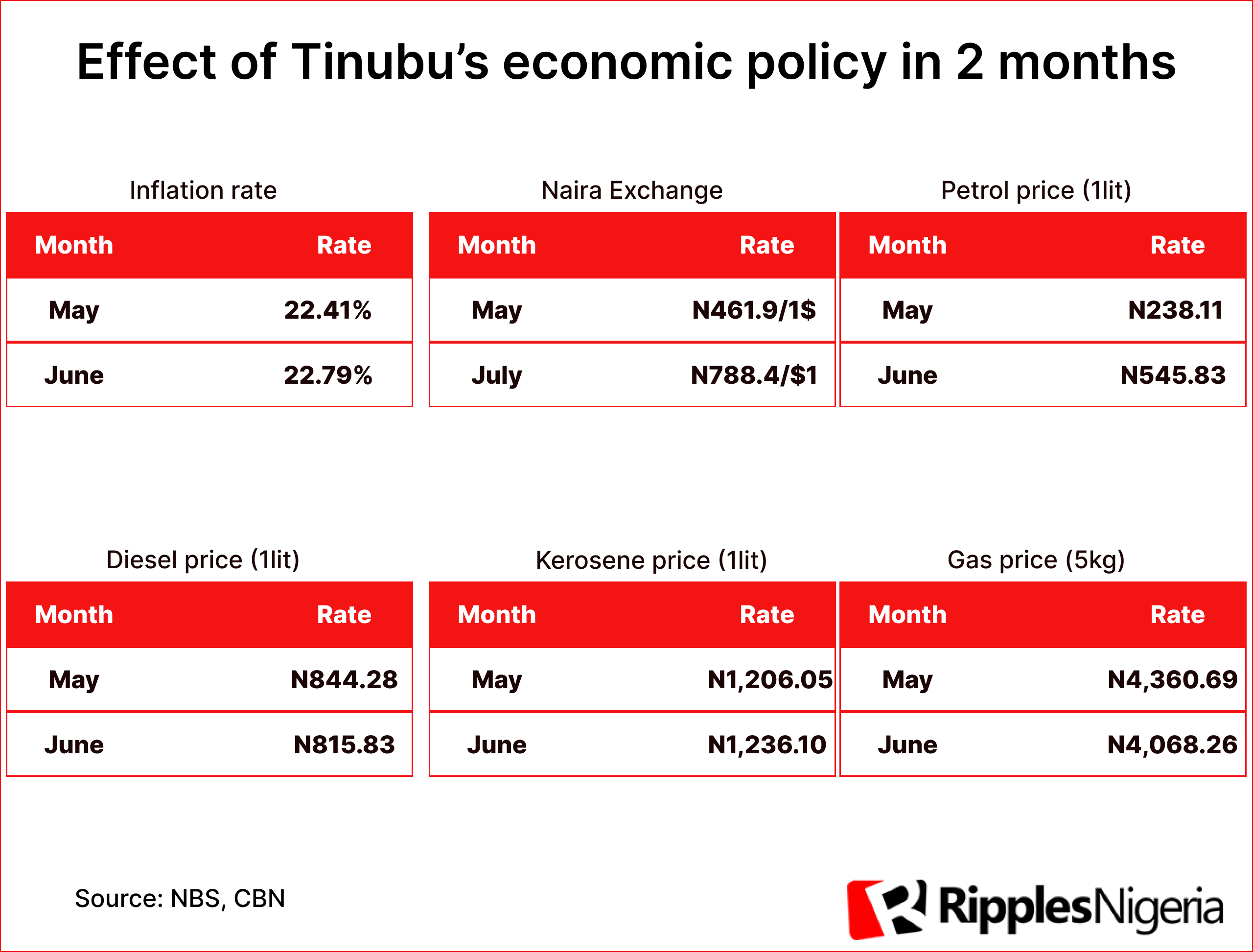Ripples Metrics
RipplesMetrics: Effect of Tinubu’s economic policy on Nigerians in two months

On May 29, President Bola Ahmed Tinubu assumed office as the 16th president of Nigeria. The change in administration was greeted by mixed reactions owing to the outcome of the general elections in February and the policies the president intended to implement as he kickstarted his administration.
For his supporters, his administration intends to address the loopholes created by the previous administration with respect to the economy, security, foreign outlook and social unity. Meanwhile, the opposition believes that the new president is incapable of fulfilling his campaign promises for several “controversial” reasons.
In spite of these reactions, the expectation of an average Nigerian is for the government to provide access to basic amenities, a favourable policy for profitable business as well as protection of lives and property.
In his inaugural address, Tinubu said, “Our mission is to improve our way of life in a manner that nurtures our humanity, encourages compassion toward one another, and duly rewards our collective effort to resolve the social ills that seek to divide us.”
He noted that his administration would address issues on security, economy, agriculture, job creation, infrastructure, fuel subsidy, monetary policy and foreign policy.
However, between the first and second times the president publicly addressed the nation, data has shown that the policy of the president has settled harshly on the public; this report intends to capture that.
From May 29 to July 29
During his inaugural address, Tinubu highlighted that his administration would be impartially governed according to the constitution and the rule of law adding that he would defend the nation from terror and all forms of criminality that threaten the peace and stability of the country and subregion.
He also mentioned that his administration would remodel the economy to bring about growth and development through job creation, food security and an end to extreme poverty.
“Women and youth will feature prominently. We will continue to take proactive steps such as championing a credit culture to discourage corruption while strengthening the effectiveness and efficiency of the various anti-corruption agencies,” he said
On issues of the economy, the president said that his administration would increase the Gross Domestic Product Index to about six per cent highlighting that this would be done through implementing budgetary reform, industrial policy, affordable and accessible electricity and reviewing all complaints about multiple taxations.
He made this expectation while announcing the immediate removal of fuel subsidy
However, data shows that from May 29 to July 29, Nigeria’s inflation rate grew by 0.38 per cent from 22.41 in May to 22.79 in June. RippleMetrics reported the inflation growth in six months. Also, the policy affected the increase in fuel prices and transportation.
READ ALSO:RipplesMetrics: Examining the cost of fuel by Nigerian govts since 1999
The devaluation of Naira has also increased the exchange rate from N461.9/1$ in May to N788.4/$1 as of July 25, 2023.
The hardship championed the provision of palliatives in cash by state governments like Ogun, Adamawa, and the federal government. There are also moves by the labour union to embark on possible strikes against some of these policies.
Data from the National Bureau of Statistics shows that the average retail price paid by consumers for Premium Motor Spirit (Petrol) in June 2023 was N545.83. This is an increase of 210.31% relative to the value recorded in June 2022 (N175.89) and 129.23% from N238.11 in May.
Also, the average retail price of Automotive Gas Oil (Diesel) paid by consumers in June 2023 was N815.83 per litre, an increase of 11.18% from N733.78 per litre recorded in the corresponding month of the previous year. As of May 2023, the price was N844.28.
For Household Kerosene (HHK), the average retail price per litre paid by consumers in June 2023 was N1,236.10, indicating an increase of 2.49% compared to N1,206.05 recorded in May 2023.
Meanwhile, on Liquefied Petroleum Gas (Cooking Gas), the average retail price for refilling a 5kg Cylinder decreased by 6.71% on a month-on-month basis from N4,360.69 recorded in May 2023 to N4,068.26 in June 2023.
Addressing the hardship
In a recent address, Tinubu said “Things seem anxious and uncertain. I understand the hardship you face. I wish there were other ways. But there is not.”
He noted that to relieve the burden the government is working with the states and local governments to implement interventions that will cushion the pains of our people across socio-economic brackets.
He said, “This period may be hard on us and there is no doubt about it that it is tough on us. But I urge you all to look beyond the present temporary pains and aim at the larger picture. All of our good and helpful plans are in the works. More importantly, I know that they will work.
“Sadly, there was an unavoidable lag between subsidy removal and these plans coming fully online. However, we are swiftly closing the time gap. I plead with you to please have faith in our ability to deliver and in our concern for your well-being.”
By James Odunayo
Join the conversation
Support Ripples Nigeria, hold up solutions journalism
Balanced, fearless journalism driven by data comes at huge financial costs.
As a media platform, we hold leadership accountable and will not trade the right to press freedom and free speech for a piece of cake.
If you like what we do, and are ready to uphold solutions journalism, kindly donate to the Ripples Nigeria cause.
Your support would help to ensure that citizens and institutions continue to have free access to credible and reliable information for societal development.
























